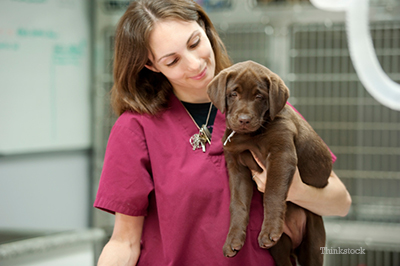
Dr. Phil Zeltzman is a traveling, board-certified surgeon in Allentown, PA. His website is www.DrPhilZeltzman.com. He is the co-author of “Walk a Hound, Lose a Pound” (www.WalkaHound.com).
October 13-19, 2019 is Veterinary Technician Week, a yearly event to honor this wonderful profession. Created in 1993, this special week is a great opportunity to educate pet guardians about this vital member of the veterinary team. What is a veterinary technician?
What is a veterinary technician?
Veterinary technology (poor name, but that’s just my opinion) is a very diverse profession. Some of the fields a vet tech can work in include:
- Horses, cows, pigs or poultry
- Zoo medicine
- Administrations
- Research
- The military
- Education
- Sales (e.g. with a pharmaceutical company)
- Pet food industry
Of course, most work with cats, dogs and pet guardians like you.
Different kinds of veterinary technicians
The examples above are mostly vet techs with a degree. That’s where it can get a little confusing. Depending on the state, veterinary nicians may have the initials RVT, LVT or CVT. Don’t feel any need to memorize these initials, they basically distinguish if a tech is registered, licensed or certified, and it’s really all the same!
There are also non-certified technicians, often called technician assistants. They usually don’t have an actual veterinary degree, but can have a ton of experience so they are indispensable members of the team as well.
As a surgeon, I work mostly with surgery and ER technicians, but the vast majority of techs work at general practices. They provide general care, which is what most pets need yearly to live long, happy lives.
General practice techs know about flea/tick/parasite/heartworm prevention, vaccine protocols, dental care, and pet nutrition. They also read fecal samples (you know, the one you love dropping off once a year).
I know of one wonderful technician who works at Cincinnati Children’s Hospital in Ohio, and several who specialize in physical therapy for pets. I know several more who work as veterinary journalists, and yet another one who specializes in anesthesia near Columbus, OH.
Specialized veterinary technicians
Indeed, as people are willing and able to provide better care for their pets, veterinarians have chosen specialties, so it is only logical that some techs decided to specialize as well, and further their education in a specific area. There are a few recognized specialties, including:
- The Academy of Veterinary Emergency Critical Care Technicians
- The Academy of Veterinary Technician Anesthetists
- The Academy of Veterinary Dental Technicians
- The Academy of Internal Medicine for Veterinary Technicians
- The Academy of Veterinary Surgical Technicians
Becoming specialized requires a lot of dedication, time and effort. The vet tech must meet stringent requirements such as a large number of hours worked in their field of interest, written case reports and continuing education.
To end on a personal note...
I just have to say that my nurses (as I call them out of respect, instead of the official veterinary technicians or “techs”) are without a doubt the main reason I am able to do what I do. They are life savers and not just pet’s lives, also vet’s lives!
If you have been to a veterinary clinic, you may remember that a technician started the consultation, admitted your pet for tests or surgery and discharged your pet after surgery. In between, behind the scenes, your pet has been taken care of by a number of incredibly dedicated nurses who drew and analyzed blood work, took X-rays, provided sedation, anesthesia and pain relief, monitored anesthesia, cleaned teeth, assisted in surgery, cleaned and sterilized surgical instruments, fed your pet, changed your pet’s bedding or litter, walked your dog, gave TLC to your cat, applied a bandage and so much more. One blog would not be enough to list everything.
I routinely see nurses hand feed finicky patients, carry them around (granted, that happens more often with cute fur balls than 80 pound Labs), pet them, give them kisses and talk to them with a funny voice.
Did you know all that (and more) was happening after you left the clinic?
So if you happen to be at a clinic this week, or if you are particularly grateful to a nurse or a group of nurses, now would be the ideal time to express your gratitude!
If you have any questions or concerns, you should always visit or call your veterinarian -- they are your best resource to ensure the health and well-being of your pets.
